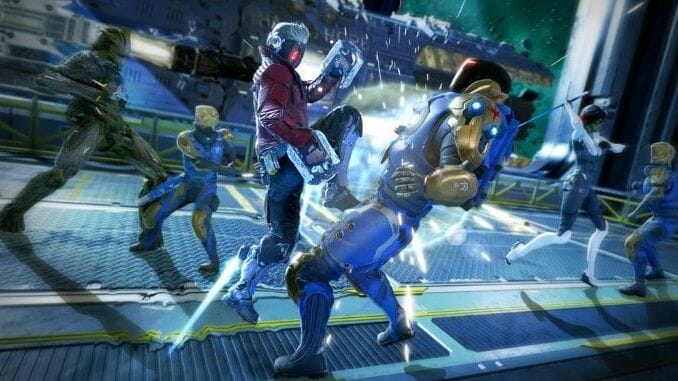The Cosmic Competence of Marvel’s Guardians of the Galaxy

I’m not one of those “keep your movies out of my games” types, whose eyes glaze over whenever a videogame enters a cut-scene or asks you to actually care about its dialogue. I’ve maybe started to lean that way, though, if only because there’ve been so many middling-to-bad examples of the cinematic game over the last several years. It’s long been the go-to for big-budget blockbuster games, but the cost, in terms of both overworked employees and bloated budgets, rarely translates to artistic success, resulting in a number of boring, overbearing, easily skippable games.
The latest big name cinematic game, Marvel’s Guardians of the Galaxy, shouldn’t win any awards, but at least it seems to realize that. As such, it works better than I expected it to. Eidos Montreal’s new game obviously owes a lot to the tone and characterization of James Gunn’s MCU movies, but it’s closer in spirit to how comic books operate, where there’s often a reset whenever a new creative team takes over a series. This Guardians doesn’t try to be a one-for-one translation of the movies; its characters aren’t modeled on the actors, their outfits and personalities and backstories can differ in ways both slight and significant, and for story inspiration it looks more to Marvel’s decades of cosmic comics than to Gunn’s two movies. It captures enough of the movies’ voice (including those omnipresent ‘80s pop hits) to keep the MCU fans interested, but has the broader sweep and scope of something set in the massive world of the comic books. If I were to keep the cinematic comparisons going, I’d say that this is squarely a B movie—the game equivalent of something you’d maybe wait to see at a dollar theater, or even just catch at random moments on basic cable when you’ve got nothing better to do, and feel sufficiently entertained.
Taking a page from Guardians of the Galaxy Vol. 2, the story focuses on Peter Quill’s family, from the biological family he was taken from in the ‘80s, to the ersatz family dynamics of the Guardians. It expands on both, using flashbacks to show more of his childhood and his relationship with his mother, while, in the present, juggling Quill’s responsibilities to his teammates alongside newer, more personal obligations. As the player, you’ll sometimes have to make Mass Effect-like decisions that will endear you to one Guardian while potentially alienating another. Do you take Rocket’s side when deciding what to do during a mission, or Gamora’s? It’s usually pretty clear who you’ll be pissing off at moments like this; I didn’t replay the game to the extent where I could track how these decisions impacted the larger direction of the story, but I did reload checkpoints at a few crucial junctures to see what sort of immediate changes were evident. In one instance one path resulted in more shoot-outs with enemy squads than the other, while another decision seemed to make a specific battle a little bit faster and easier. I don’t expect that I’ll ever have the time to play it again to see if major plot points can be altered by my decisions, but there still seems to be enough possibility baked into these choices to make your playthrough feel somewhat unique.
When you’re not choosing your own adventure or chatting with your space pals, you’ll spend a lot of time exploring planets and spaceships, and shooting the creatures that hang out on them. Guardians of the Galaxy is essentially a multiplayer game restricted to a single player. You’ll take direct control of Peter Quill, who packs a couple of space pistols with environmental power-ups and a handy pair of jet boots. His four fellow Guardians will brawl alongside you, delivering meager damage to enemies while waiting on you to give them the command for their special attacks. Each character has up to four special attacks that can be unlocked, and naturally each character has a cooldown meter for their specials, so you can’t just spam Rocket’s grenades over and over. You’ll quickly realize some of those specials work really well in tandem—have Drax plow through a bad guy’s shield, and then immediately command Gamora to deal them a jumping sword strike, for example. It can sometimes be a little too easy to forget to give your teammates orders when you’re feeling the flow of the fight, but you’ll probably die often enough during battles to get over that pretty quickly. Knowing how and when to use the other Guardians’ special attacks is crucial if you don’t want to quickly die in every battle.
-

-

-

-

-

-

-

-

-

-

-

-

-

-

-

-

-

-

-

-

-

-

-

-

-

-

-

-

-

-

-

-

-

-

-

-

-

-

-

-








































